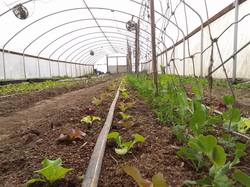 Look close! Can you see the microbes?
Look close! Can you see the microbes? A Cup of Tea for Our Veggies - by Jesse Honiker
Do you love your morning cup of tea? Well, our plants and soil here at Pigman’s Produce Patch does too! Now, we don’t give them black or oolong tea – no, we provide our plants with quality compost tea.
Yes, it is actually what it sounds like. For 24 hours, we soak a mixture of our farm’s compost, cured chicken manure, and some fungal microbes, with a splash of molasses, liquid kelp, or humic acid to create a liquid teaming with a healthy microbial community, or as we call them, “soil defenders.”
Do you love your morning cup of tea? Well, our plants and soil here at Pigman’s Produce Patch does too! Now, we don’t give them black or oolong tea – no, we provide our plants with quality compost tea.
Yes, it is actually what it sounds like. For 24 hours, we soak a mixture of our farm’s compost, cured chicken manure, and some fungal microbes, with a splash of molasses, liquid kelp, or humic acid to create a liquid teaming with a healthy microbial community, or as we call them, “soil defenders.”
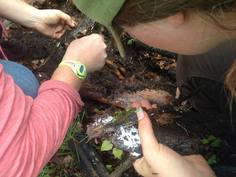 Photo by Rita: Gena & Jesse Fungus Hunting
Photo by Rita: Gena & Jesse Fungus Hunting Now, we are getting a little ahead of ourselves, why do we want to put microbes and fungus into our soils? It helps to think that compost tea is to the soil as probiotics are to humans. A team of bacteria and even yeast (fungus) helps us break down the food in our gut. Compost teas, teeming with microbial life, help break down what we feed to our soils. So, when we feed our soil cured compost, manure, or trace minerals, those microbes help unlock the nitrogen, phosphorus, and potassium in the soils and cycle these nutrients into a usable form for our crops. “Soil Gatekeepers” is starting to sound like a more appropriate name, no?
The compost tea we make on the farm comes in two forms: bacterial dominant teas and fungal dominant teas. The bacterial teas go on our annual crops – where fields will be tilled within the year. Fungal dominant teas go on our perennial crops – where fields will not be tilled in the foreseeable future. Fungal-dominant soils can’t withstand tilling because their ribosomal structure is lost. Bacterial microbes can withstand tilling. So for annual as opposed to perennial crops, we are creating different types of soil communities.
The compost tea we make on the farm comes in two forms: bacterial dominant teas and fungal dominant teas. The bacterial teas go on our annual crops – where fields will be tilled within the year. Fungal dominant teas go on our perennial crops – where fields will not be tilled in the foreseeable future. Fungal-dominant soils can’t withstand tilling because their ribosomal structure is lost. Bacterial microbes can withstand tilling. So for annual as opposed to perennial crops, we are creating different types of soil communities.
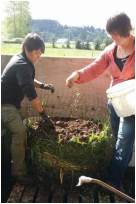 Photo by Jesse: Rita & Gena hard at work creating a fungal dominate compost pile
Photo by Jesse: Rita & Gena hard at work creating a fungal dominate compost pile A few weeks ago, we made a fungal dominant compost pile so we can grab fungus on the go for brewing tea! By layering wood chips, sawdust, oatmeal, and fresh grass clippings dosed in a molasses based brewer’s barley malt, we started growing a robust population of fungus in just weeks!
Rest assured your farmers are feeding their soils the best elixir possible, as you sip your morning cup of tea. Here’s to compost tea!
Rest assured your farmers are feeding their soils the best elixir possible, as you sip your morning cup of tea. Here’s to compost tea!
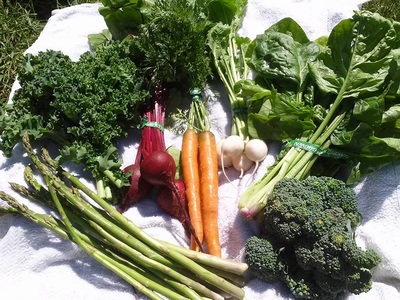
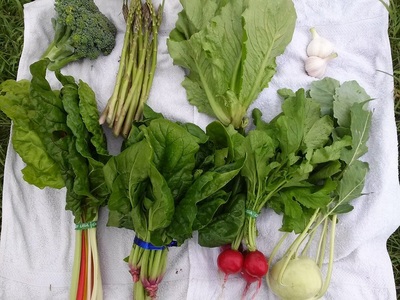
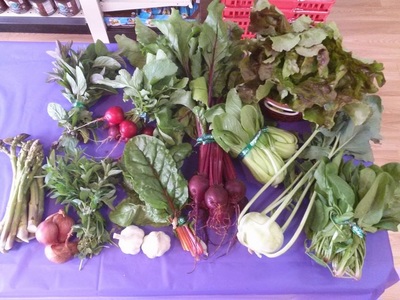
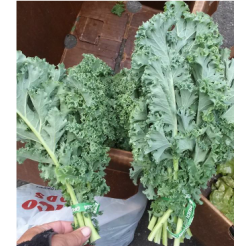
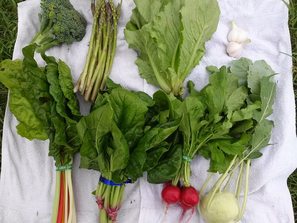
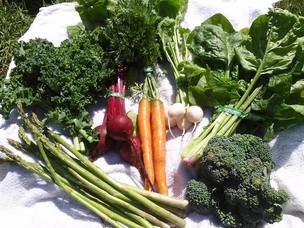
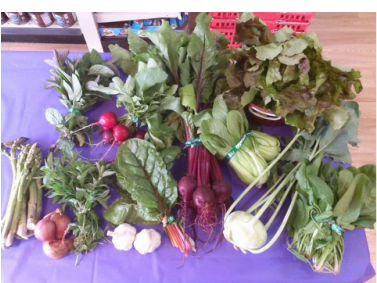
 RSS Feed
RSS Feed
